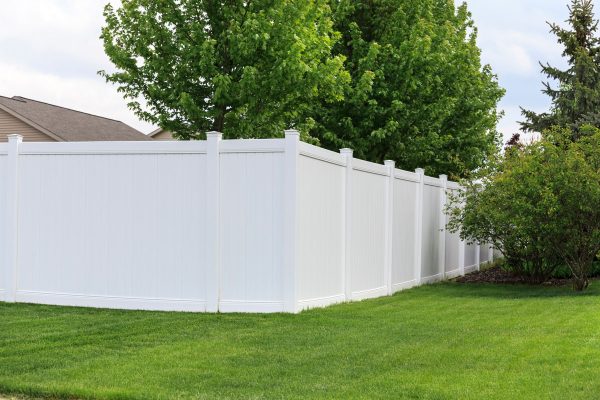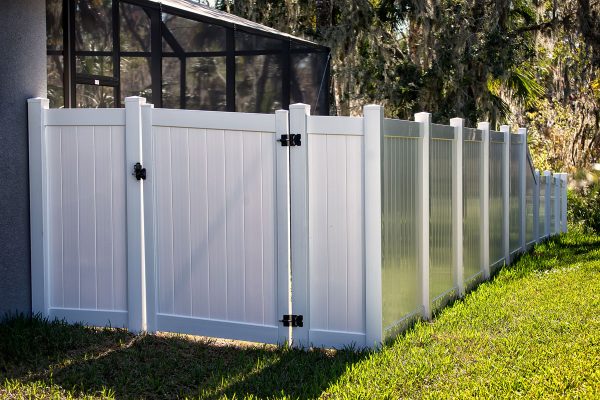Vinyl fencing is a popular choice for homeowners because it is affordable, durable, and easy to maintain. But does vinyl fencing stand up to wind? And if it doesn't, what are some other fence options that can withstand wind? Luckily, we've researched this to see the sturdiness of vinyl fencing.
Vinyl is a sturdy material that can stand up to high winds without becoming damaged. It's also a relatively affordable option, so it's a superb choice if you're on a budget. Additionally, vinyl fencing is available in a variety of styles, so you can find the perfect option to match your home.
If you're looking for a fencing option that can withstand strong winds, vinyl may be the right choice for you.To learn more about vinyl fencing, keep reading this post. Then, check out the different tips on how you can keep your vinyl fencing strong and sturdy.
![A modern middle class home with its backyard being enclosed for privacy by a new, modern style white vinyl fence. Green grass, and blue sky is in the background., Can Vinyl Fencing Withstand Wind? [Plus 7 Windproofing Tips!]](https://fencefixation.com/wp-content/uploads/2022/06/Can-Vinyl-Fencing-Withstand-Wind-Plus-7-Windproofing-Tips.png)
Why Vinyl Fencing Can Withstand High Winds?
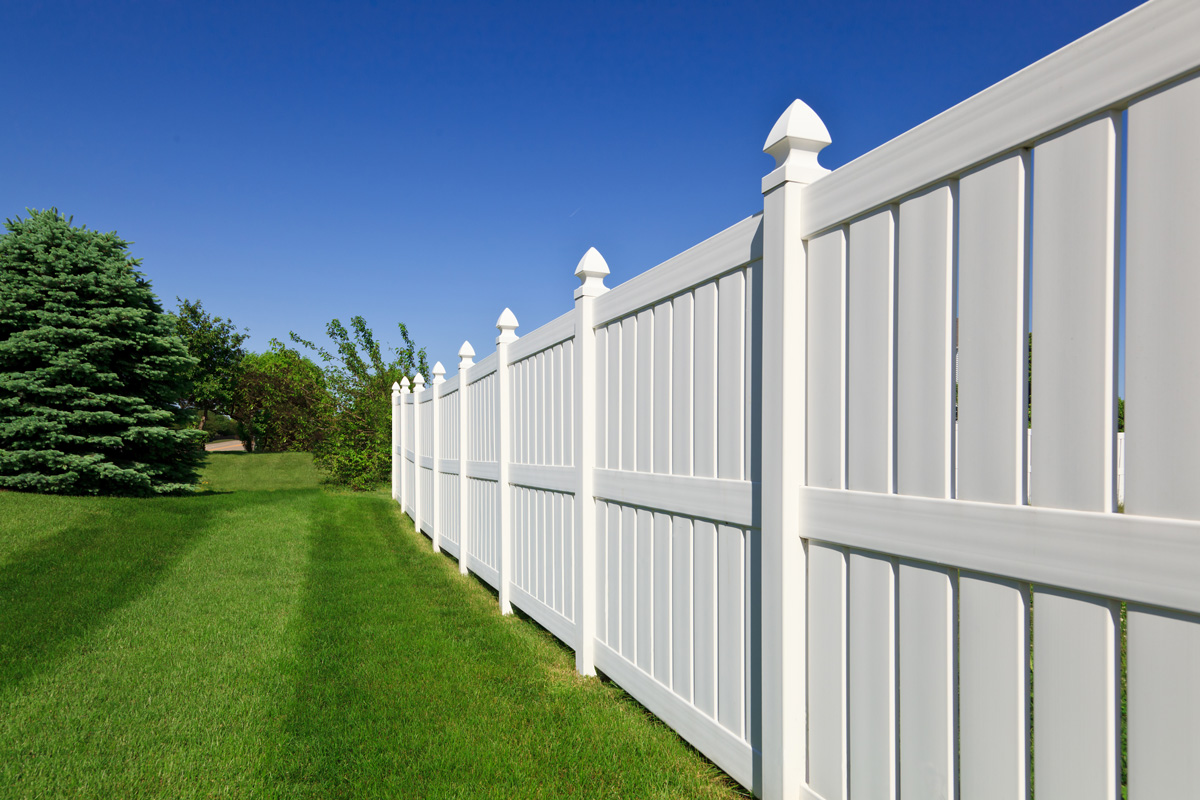
When it comes to fencing, there are a variety of options to choose from. Wood, aluminum, and chain link are all popular choices, but each has its own advantages and disadvantages. Vinyl fencing is one option that is becoming increasingly popular due to its low maintenance requirements and durability.
Vinyl fencing is made from tough synthetic materials that are designed to withstand harsh weather conditions. The posts and panels are interlocked to create a sturdy barrier, and the material is flexible enough to absorb the impact of strong winds.
In addition, vinyl fencing is usually installed with concrete footings that help to anchor it in place. As a result, vinyl fencing can withstand hurricane-force winds and is an excellent choice for homeowners in coastal areas.
What Is The Best Way To Secure Vinyl Fencing In Windy Areas?
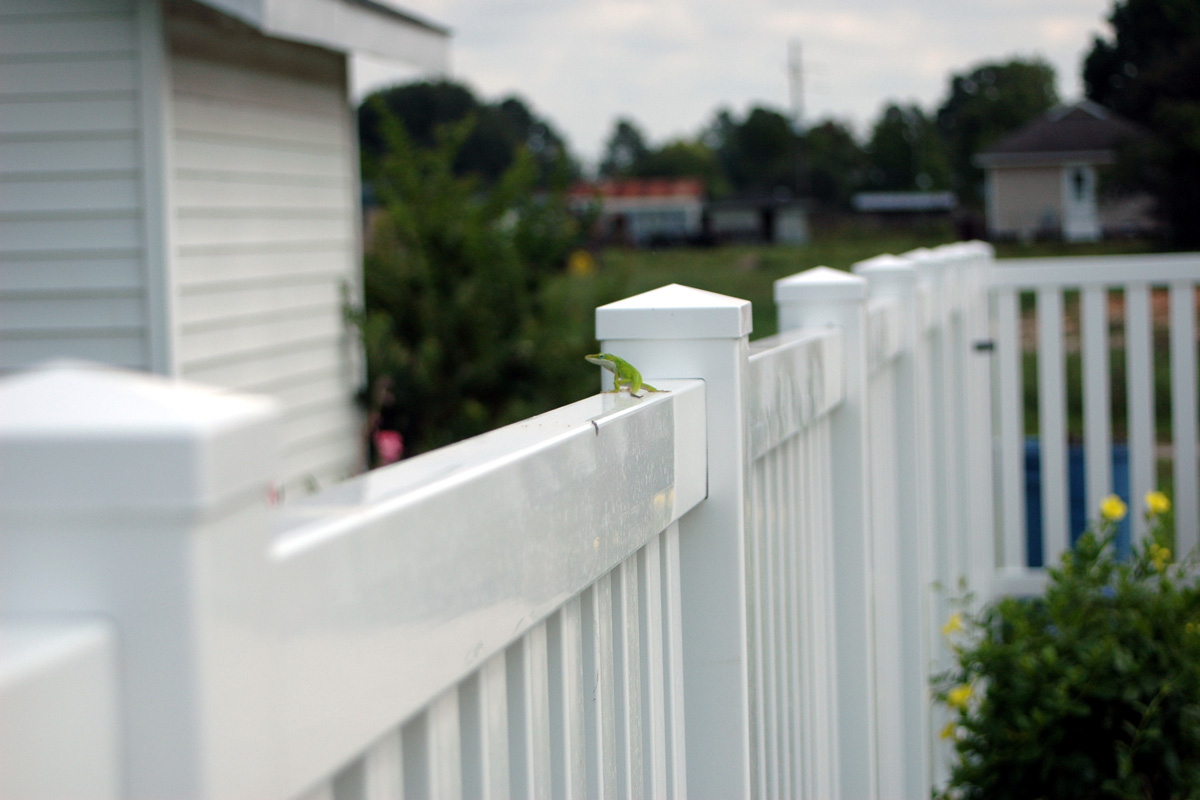
When it comes to vinyl fencing, the wind is one of the most common causes of damage. High winds can cause the fence panels to warp or break, and can also loosen the posts, causing the entire fence to collapse. As a result, it is important to take steps to secure your fence in windy areas.
Securing your vinyl fence is important not only for its aesthetic value but also to preserve its functionality. If your fence isn't properly secured, strong winds can cause serious damage. Here are a few tips to help keep your vinyl fence in good condition:
Tip 1: Choose the Right Type of Vinyl Fence
Vinyl fencing comes in a variety of styles, but not all types are suitable for windy areas. If possible, choose a fence with vertical slats or pickets, as these will be less likely to blow over in high winds.
Tip 2: Secure the Vinyl Fence on the Ground
The posts should be made of a sturdy material that will not rot, such as aluminum or steel. You will also need to purchase gravel to line the bottom of the hole that you will be digging for the posts. This will help with drainage and prevent the posts from moving around.
The holes should be at least two feet deep and wide enough to fit the posts snugly. After you have placed the posts in the holes, fill the holes with gravel and then concrete. Allow the concrete to dry overnight before attaching the vinyl fence panels.
With proper planning and installation, your vinyl fence will be secure and stable for years to come.
Tip 3: Install Windbreaks
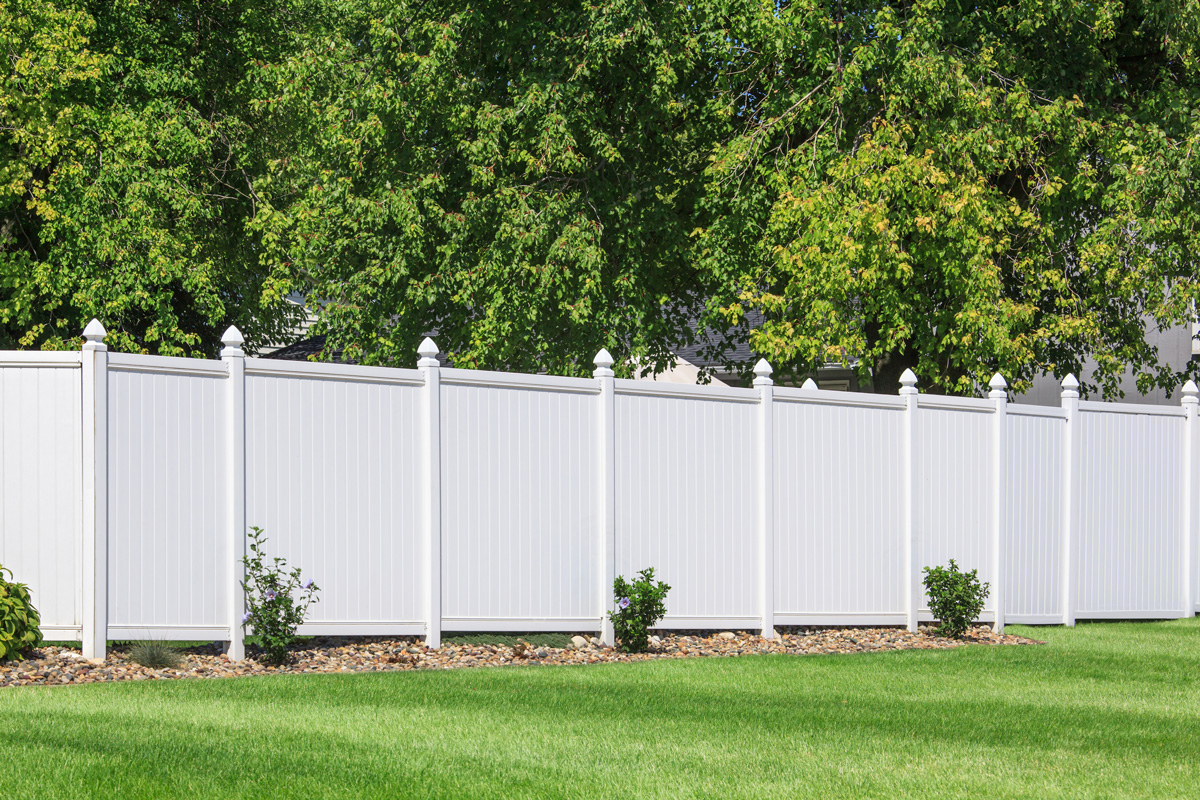
To help protect your fence from wind damage, you can install windbreaks. Windbreaks are barriers that help to deflect the wind away from your fence. They can be made from a variety of materials, such as wood, stone, or metal.
You can also plant shrubs or trees around your fence to create a natural windbreak. If possible, install vinyl fencing in windy areas behind a row of trees or shrubs. This will help to protect the fence from strong winds and reduce the amount of work required to keep it installed.
Tip 4: Heavy-duty Posts and Brackets
To help prevent wind damage, it is important to use heavy-duty posts and brackets when installing a vinyl fence. The posts should be sunk at least two feet into the ground, and the brackets should be securely fastened to the posts.
In addition, it is important to use a high-quality vinyl fence that is rated for wind resistance.
Tip 5: Add Reinforcement Bars
Another option is to add reinforcement bars to the inside of the fence panels. By doing this, the fence will be better able to withstand the force of the wind, and it will be less likely to suffer damage.
This will help to distribute the force of the wind more evenly and will prevent the panels from bowing or breaking.
In addition, the reinforcement bars will help to keep the fence panels from sagging or warping over time. As a result, adding reinforcement bars is an effective way to help ensure that your vinyl fence will stand up to the elements for years to come.
Tip 6: Adding Guy Wires
You may also want to consider adding guy wires to provide additional support for the fence posts. Guy wires are an effective way to secure your vinyl fence in high winds.
By attaching the guy wires to the posts at the top and bottom of the fence, you can provide additional support that will help keep the fence from being blown over.
In addition, you should make sure that the guy wires are properly anchored into the ground. This will help to ensure that they don't come loose during a storm and cause further damage to your fence.
While guy wires can be a bit of a hassle to install, they can provide peace of mind during severe weather and help keep your vinyl fence looking great for years to come.
Tip 7: Inspect the Condition of your Fence Regularly
Inspect the condition of your fence regularly. Strong winds can damage any type of fencing, but vinyl is particularly vulnerable. Check the posts and rails for cracks or splits, and look for loose or missing fasteners.
If you find any damage, make sure to repair it promptly. It's also a good idea to check the stability of the posts, especially if they're set in concrete.
Over time, the concrete can start to crumble, which can make the posts unstable. If you see any signs of damage, consider having the posts reinforced.
By taking these precautions, you can help ensure that your vinyl fence will withstand even the strongest winds.
What Are Some Benefits Of Using Vinyl Fencing?
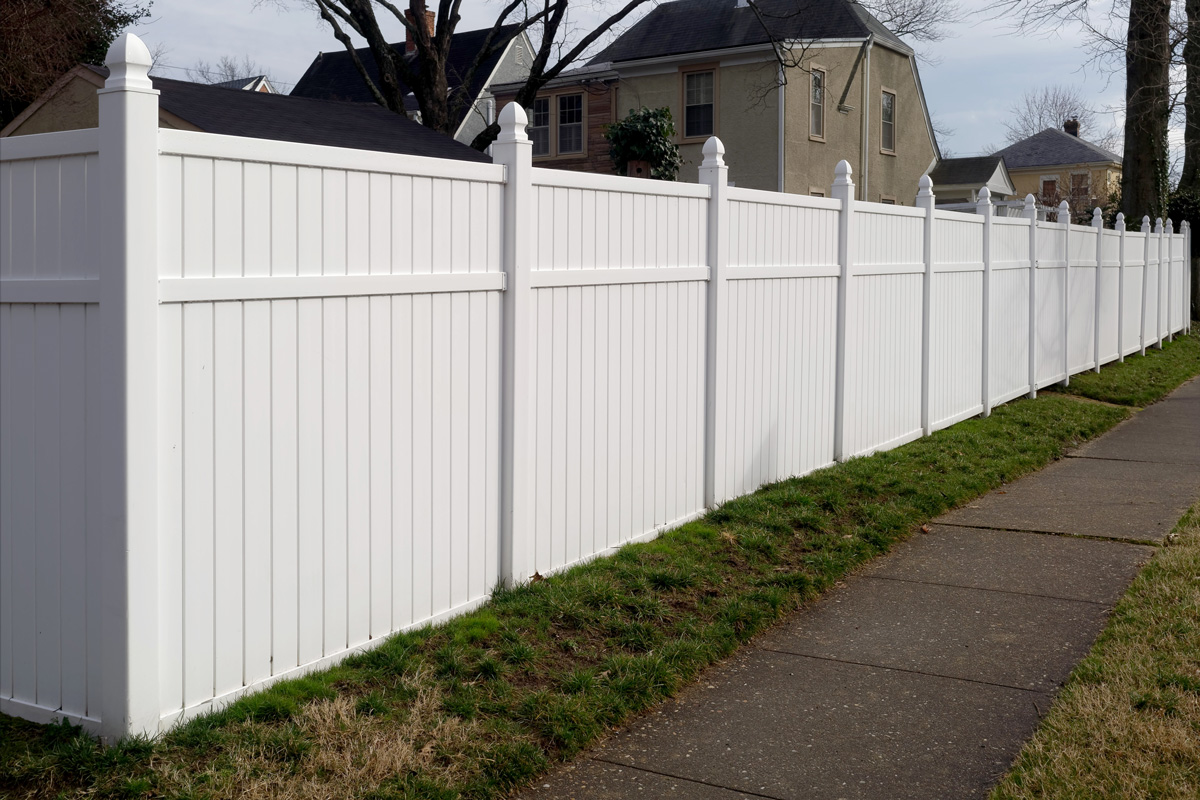
Vinyl fencing has a number of advantages over other types of fencing. For example, it is:
Durable
Vinyl fencing is made from tough synthetic materials that can withstand high winds and heavy rains.
Low maintenance
Unlike wood fencing, vinyl fencing does not require regular painting or staining.
Flexible
Vinyl fencing is flexible, which makes it less likely to warp or break in high winds.
Easy to install
Vinyl fencing is usually easy to install and does not require special tools or expertise.
Attractive
Vinyl fencing is available in a variety of colors and styles and can enhance the appearance of your home.
If you are looking for a durable, low-maintenance fence option, vinyl fencing may be the right choice for you.
What Kind Of Damage Can High Winds Cause To Vinyl Fencing?
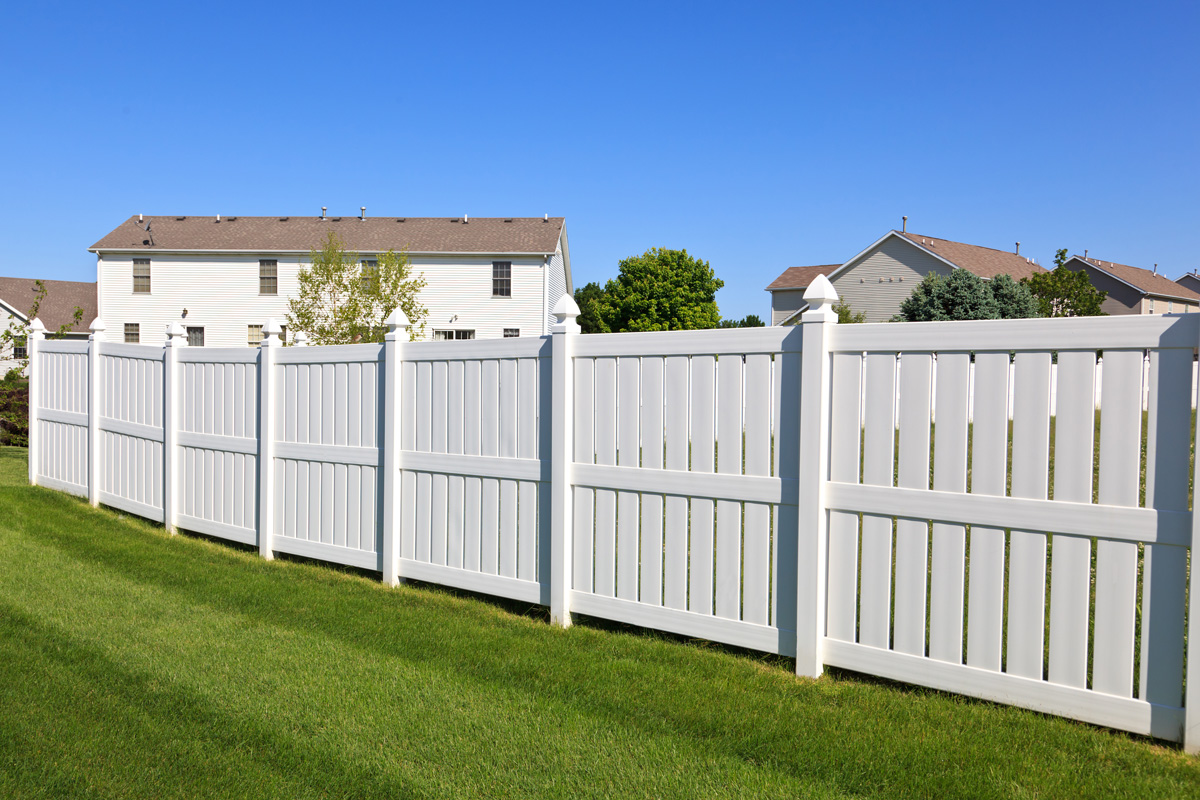
High winds can be a problem for any type of fencing, but vinyl fencing is especially vulnerable. The material is lightweight and can be easily blown over by strong winds.
In addition, the winds can cause the vinyl to crack or break, which can damage the fence and make it more difficult to repair. In some cases, the damage caused by high winds can be so severe that the fence needs to be completely replaced.
As a result, it is important to take steps to protect your vinyl fence from high winds. By taking these precautions, you can help to ensure that your vinyl fence will withstand the force of high winds.
How Do You Properly Maintain Vinyl Fencing In Windy Climates?
Vinyl fencing is a popular choice for both residential and commercial properties because it is durable and low-maintenance. However, in windy climates, vinyl fencing can be susceptible to damage from strong winds.
To help prevent wind damage, it is important to properly maintain your vinyl fence.
- First, remove any debris that has accumulated on the fence, such as leaves or branches. This will help reduce the amount of wind resistance the fence has to deal with.
- Additionally, make sure that the fence posts are securely anchored in the ground.
- Over time, the posts may loosen, and strong winds can cause them to topple over.
- Finally, keep an eye out for any cracks or holes in the vinyl material. These can act as entry points for wind and can cause the fence to become further damaged over time.
By following these simple tips, you can help ensure that your vinyl fence remains in good condition despite high winds.
Final Thoughts
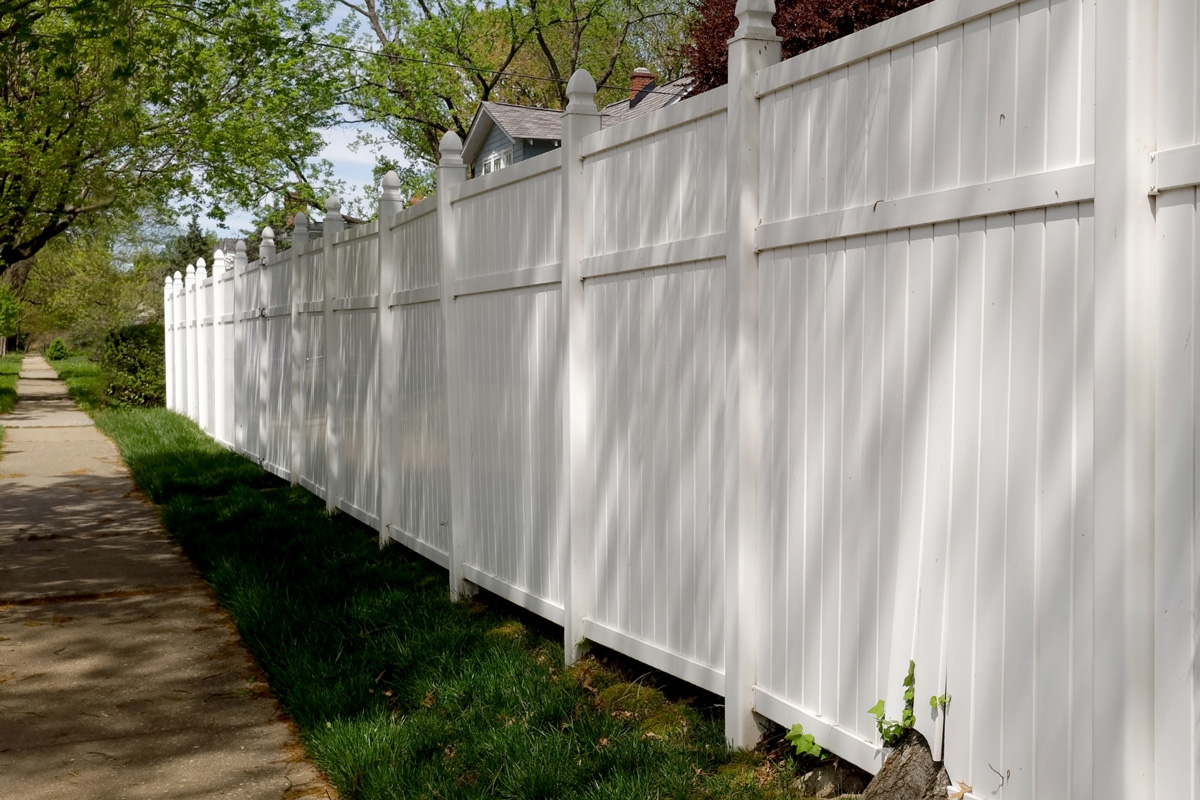
Vinyl fencing is a great option for homeowners looking for an attractive, low-maintenance fence that can withstand the wind. If you’re considering vinyl fencing for your home, you can always reach out to experts to learn more about fence products and installation services.
To get more suggestions on how to keep your fence intact, see our posts below:
5 Types Of Fence Post Caps [How To Choose For Your Type Fence]
Should Fence Posts Be Pressure Treated? [And How To Prevent Rotting]

![A white vinyl fence running across a yard on spring day with blue sky and trees in the background, Can Vinyl Fence Touch The Ground? [Plus Tips On How To Close The Gap]](https://fencefixation.com/wp-content/uploads/2022/06/A-white-vinyl-fence-running-across-a-yard-on-spring-day-with-blue-sky-and-trees-in-the-background-600x400.jpg)
